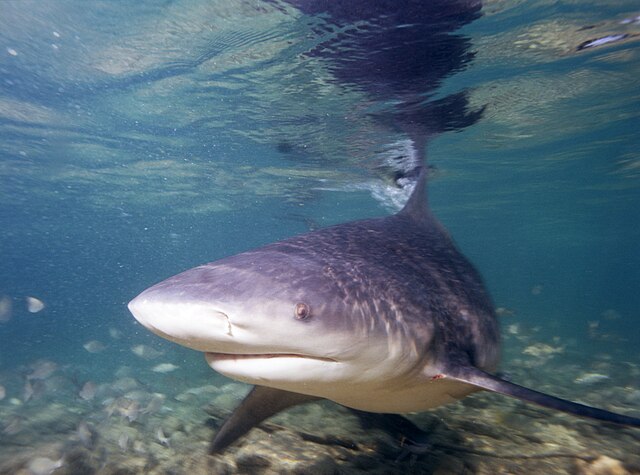遠洋鳥科
来自维基百科,自由的百科全书
遠洋鳥科(學名:Pelagornithidae),或稱偽齒鳥科,是一類已經滅絕的大型海鳥,其化石遺蹟在全球各地早古新世至上新世-更新世之交的岩層中均有發現。[1][2]
| 遠洋鳥科 | |
|---|---|

| |
| 美國國立自然史博物館的中新遠洋鳥復原裝架 | |
| 科學分類 | |
| 界: | 動物界 Animalia |
| 門: | 脊索動物門 Chordata |
| 綱: | 鳥綱 Aves |
| 小綱: | 雞雁小綱 Galloanserae |
| 演化支: | 齒雁類 Odontoanserae |
| 目: | †齒翼鳥目 Odontopterygiformes Howard, 1957 |
| 科: | †遠洋鳥科 Pelagornithidae Fürbringer, 1888 |
| 屬 | |
| 異名 | |
|
Cyphornithidae Wetmore, 1928 | |
遠洋鳥科鳥類最大的特點便是其喙邊緣的牙齒狀凸起,這些凸起並非真正意義上的牙齒:這些生長在前上頜骨和下頜骨的「牙齒」含有福耳克曼氏管,說明其實際上是骨質結構的延伸。哪怕是該類群最「小」的物種也可以達到信天翁的大小,而最大的成員翼展可達5至6米,是有史以來出現過的最大的飛鳥。在真正的人類出現前大部分時間裏,遠洋鳥類都是大洋上的主流海鳥之一,但遠洋鳥類和人類還是以自然史上極其微小的時間差距錯過了對方——已知最後的遠洋鳥類和標誌着人類技術史開端的能人恰好生存於同一時間。[3]
描述

最大的遠洋鳥類幾乎是最大的飛鳥。幾乎所有[4]發現於新近紀的遠洋鳥類體型都相當巨大,但一些發現於古近紀的物種則體型較小,有的只有大信天翁的體型。發現於古新世-始新世之交摩洛哥的未描述物種 「意外緣齒鳥」(Odontoptila inexpectata)[5]是已發現的最小的遠洋鳥類,它只比白頦風鸌大一點。[6]
遠洋鳥類的骨骼較薄且高度氣室化,有肺部延伸出的氣囊,因此大部分遠洋鳥類的肢骨標本都呈壓碎狀態。因為遠洋鳥類骨骼纖細而高度氣室化,所以它們可以在低於臨界翼載荷的情況下長的儘可能的更大。雖然25kg/m2常被視為鳥類動力飛行的最大翼載荷,但有研究證明,遠洋鳥類能幾乎完全以動力滑翔的方式飛行:其股骨的近段的特殊結構使得遠洋鳥類幾乎無法完成典型的鳥類撲翼動作;它們的確切重量也因此難以被估計。遠洋鳥類負責保持上臂伸直的肌肉的附着位置相當發達,其解剖學特徵似乎能允許其鎖定前肢關節,這是任何已知鳥類都無法比擬的。這一特徵在新近紀的遠洋鳥科中尤為明顯,而相對原始的古近紀遠洋鳥科中並沒有那麼發達。其胸骨具有典型的深而短的適應動力滑翔的特徵,其龍骨突前緣的骨突將叉骨牢牢固定。[7]

遠洋鳥類的腿等比例縮小,腳上可能有蹼,其踝骨類似信天翁, 而跗跖骨與前腳趾的排列卻更像暴雪鸌。遠洋鳥類的「牙齒」在生前可能由角質鞘覆蓋,上喙的下部有兩條脊,而在脊的內側生長有「牙齒」。因此當喙閉合時,僅有上喙的「牙齒」是可見的,下喙的「牙齒」被藏在上喙「牙齒」的後面。在一些遠洋鳥類——至少是進步的遠洋鳥類——的眼眶中有發達的鹽腺存在。 [8]
迄今為止的遠洋鳥科成員中,並沒有發現保存完整的軀幹化石,大部分保存完好的標本多為單個骨骼;但另一方面,遠洋鳥科較大的體型和漫長的延續時間也使得總會有一些保存較為完好的個體(儘管其標本通常被地層擠壓形變或破碎),有些個體甚至保留了化石化的羽毛。頭骨的主體部分和一些喙的碎片被發現的次數並不多。2009年2月,利馬的研究人員公開了一個發現於秘魯伊卡省的奧庫卡赫區的、900萬年前的、幾乎完整的、可能屬於齒翼鳥屬的頭骨化石 。根據發現該標本的古生物學家馬里奧·烏爾維納(Mario Urbina)及其同事羅多爾夫·薩拉斯(Rodolfo Salas)、肯·坎貝爾(Ken Campbell)和丹尼爾·T·克塞普卡(Daniel T.Ksepka)的說法,該標本(「奧庫卡赫頭骨」)是彼時保存最完好的遠洋鳥科頭骨。 [9]
外觀




遠洋鳥類並沒有留下現存的後代,因此我們對於這類鳥的配色一無所知。但是可以基於它們的系統發育地位做出一些推論:如果它們屬於「高等水鳥」(鸌形目、鵜形目、鸛形目等),其羽毛會因缺乏類胡蘿蔔素和相關的生理結構而呈現出單調的黑白灰色。雖然這些類群中也有彩色的物種,但這些物種多生活在淡水環境中。[10]
如果遠洋鳥類是雞雁小綱的成員,則它們的羽毛中可能會出現黑色素,但值得注意的是,基幹的雁形目通常是灰色、黑色或黑白的。一般來說,遠洋海鳥的背面往往比腹面暗得多(儘管一些海燕是全身灰黑色的),這是一種偽裝適應,可以混淆水下獵物視野中的捕食者。在飛鳥中,黑色的飛羽相當常見,甚至是一些身體大部分地方都為白色的鳥也會有着黑色的飛羽(例如某些鵜鶘和長冠八哥),這是因為黑色素的聚合會加強羽毛的強度,使得黑色的羽毛相對其他羽毛更為強健,能更好的在飛行過程中抵抗損壞。在遠洋鳥類這樣依賴強風飛行的鳥類中,黑色的翼尖和尾羽[11]是有很大可能會出現的。[10]
關於沒有覆羽的裸露皮膚,遠洋鳥科所有的可能的現存近親都或多或少有着明紅色的裸露結構,而這通常分佈在在喙上或喙附近。如其可能的近親:基幹雁形目和「高等水鳥」一樣,遠洋鳥類不大可能存在明顯兩性異形的現象。[10]
生態學

不像諸如始祖鳥和魚鳥之類中生代鳥類的真牙,遠洋鳥類的假牙並沒有切割能力,這些假牙只有固定獵物和輔助吞咽的作用。考慮到這些牙齒內應該是空心或鬆質的,且化石狀態下極易破損或折斷,活體狀態下的偽齒應該也不會非常有彈性。因此遠洋鳥科很大可能會捕食頭足動物[12]和軟皮魚類[13]。儘管一些復原將遠洋鳥類視為鰹鳥式的潛水鳥類,但實際上其輕薄的骨骼無法適應這種捕食模式使得捕食過程變得危險,因此遠洋鳥潛水捕食的可能性並不大。遠洋鳥類的下頜更像鵜鶘等可以張開嘴捕食的鳥類,因此這些大鳥應該是在水面划過,捕食那些貼近海面的獵物。總之,遠洋鳥類填補的是大型食魚翼龍的生態位,這些翼龍在白堊紀末的滅絕為遠洋鳥科長達5000萬年的所向披靡鋪平了道路。與現代的信天翁相似,遠洋鳥類可以利用洋流和大氣環流採取環形路線在開闊的洋面上空翱翔,每隔幾年回到特定的繁殖地繁殖後代。於現代信天翁不同,現代信天翁的分佈避開了熱帶輻合帶和赤道逆流,而遠洋鳥類則分佈在各種各樣的氣候環境中:約4000萬年前起,遠洋鳥類在從比利時到多哥再到南極洲的廣袤海岸線上都有這類大鳥的記錄。 其化石常常與企鵝或普魯托翼鳥這樣生活在大陸架上的不會飛行的潛水鳥類一同發現,因此遠洋鳥類或許會在一些上升流區域聚集,可能是為了覓食,也可能是為了繁殖。[14]

有時會有人認為鯨類和鰭足類的輻射演化與競爭是遠洋鳥類與其他一些海鳥(如不會飛的普魯托翼鳥類)在中新世衰弱甚至滅絕的原因。這或許對普魯托翼鳥這樣不會飛行的鳥類成立,但對遠洋鳥類的影響應當微乎其微:首先,遠洋鳥類在現代鬚鯨出現後仍然存在並繁衍了1000萬年,在中新世中期,遠洋鳥與多種鯨類共享着棲息地,因此遠洋鳥類與鯨類有着相當長的共存周期,至於中新世的鰭腳類,東北太平洋生活有多種原始的海象[15]和諸如Thalassoleon的原始海狗,而東南太平洋則生活有弓海豹這樣的原始豹海豹,因此遠洋鳥類也與鰭足類有着長期的共存。其次,鰭足類僅活動於近岸水域,而遠洋鳥類則像大型鯨類一樣在遠海漫遊,且與其他所有大型食肉動物一樣,這三個類群都遵循K繁殖策略,其個體密度中等甚至較低,較少的數量會顯著降低競爭的烈度。[16]
因此,遠洋鳥類與鯨類、鰭足類的直接食物競爭不會非常激烈。但由於鳥類和鰭足類都需要海邊的平坦地面來養育幼崽,因此對繁殖地的競爭可能會在某種程度上限制了鳥類的數量。對於遠洋鳥類這樣向動力滑翔特化的鳥類,其起飛高度依賴高處的上升氣流,因此適合它們育幼的地區會更少,就像許多現代信天翁會選擇在島嶼的高地上築巢一樣,遠洋鳥類可能也會在這些鰭足類動物無法進入的島嶼或沿海山脈上築巢,進一步減弱了其與鰭腳類的競爭。來自加那利群島,蘭薩羅特島,法馬拉山脈的大型蛋殼碎片暫時被歸為晚中新世的遠洋鳥類;沉積自淺海的謝配島牛津粘土層也常發現遠洋鳥科的化石;新近紀的遠洋鳥類在阿巴拉契亞山脈和科迪勒山系附近的美洲海岸常有發現,因此這些物種可能也在離岸不遠的地方——甚至是在山區本身進行繁殖;北卡羅來納Lee Creek礦中發現的髓質骨也值得關注——這一特徵常出現在產卵的雌鳥身上——似乎說明離此不遠的地方可能有遠洋鳥的繁殖地。此外,太平洋上的火山島在數百萬年的時間裏也會因各種原因被逐漸侵蝕,這或許會抹除掉遠洋鳥類的繁殖痕跡。例如,在1000萬年前,骨齒鳥仍活躍於大洋上時,內克爾島的規模遠比現在要巨大。[17]
1400萬年前的中中新世滅絕事件和隨後的墨西拿鹽度危機極大程度的破壞了海洋生態系統,遠洋鳥類的為代表的海鳥首當其衝,遠洋鳥類自此走向沒落。而第四紀冰期的開始與板塊運動導致的洋流劇變(如南極繞極流的形成和巴拿馬地峽形成引發的洋流變化)使得遠洋鳥類作為古近紀動物群殘餘的處境雪上加霜,並最終走向了滅絕。

不管遠洋鳥類為何滅絕,它們的存在為很多大型掠食者提供了獵物。與遠洋鳥類共存的鳥類很少有能真正傷害到它們的,但正如始新世軍艦鳥Limnofregata所證明的那樣,軍艦鳥類與遠洋鳥類經歷類長期的協同演化,軍艦鳥類或許會像劫掠現代的信天翁那樣劫掠一些小型的遠洋鳥類。從Lee Creek礦的中中新世和早上新世中一些已知的遠洋鳥化石中可以得知,遠洋鳥類在捕食過程中可能成為鯊魚的獵物。Lee Creek礦中發現有扁頭哈那鯊、沙虎鯊、鯖鯊、諸如大白鯊的大型鼠鯊、[18]半鋸齒鯊、鼬鯊、真鯊、檸檬鯊和雙髻鯊,考慮到遠洋鳥類生存的時期,這些海鳥也可能會遇見鋸鰩、砂錐齒鯊、鼠鯊和偽鯖鯊。但值得注意的是,相較於遠洋鳥類,海雀、潛鳥、鸕鶿等小型潛水鳥和信天翁更常出現在這些掠食者的胃容物中,側面證明了遠洋鳥類有着更低的種群密度且其捕食過程主要在空中進行。[19]
分類與演化
長期以來,該類群在中文世界被泛稱為「偽齒鳥科」/「偽齒鳥類」,這一稱呼對應的是英語中對該類群的暱稱「false-toothed birds」或「pseudotooth birds」,而這一暱稱顯然源自偽齒鳥屬(Pseudodontornis)。20世紀中葉的文獻中,這一類群被廣泛稱為「偽齒鳥科」(Pseudodontornithidae),但實際上,「遠洋鳥科(Pelagornithidae)」這一名稱的出現要早於「偽齒鳥科」,因此當今的研究人員更傾向於使用「遠洋鳥科」的稱呼。[21]
有關遠洋鳥類系統發育地位的爭議相當巨大。早年間,這一類群常因為其相似的外表結構被歸入「鵜形目」(當時還是並系群)或鸌形目。一些森林鳥屬的大型標本曾被錯誤的歸入古顎類或加斯頓鳥科,這些標本甚至被用來論述這兩類鳥之間的親緣關係。但現在,鰹鳥目,鸛形目或鵜形目已經分開,三者與潛鳥目,南極鳥類一同構成了「高等水鳥」的演化支。然而,現在遠洋鳥類已經不常被視為鵜鶘和信天翁之間的「過渡物種」了,一般只會認為其與前者存在親緣關係,而與後者只有相同生態位上的趨同演化。[23]


2005年,一項研究指出遠洋鳥類的應當是雁形目的近親。這項研究指出遠洋鳥類不是「高等水鳥」,而是雞雁小綱的成員。一些主要來自頭骨的特徵支持了這一觀點。例如遠洋鳥類缺乏齶骨下側的嵴,而包括「高等水鳥」在內的新鳥小綱都有這一特徵。 此外,像雁形目鳥類一樣,遠洋鳥科鳥類在方骨的下頜突上只有兩個髁,而不是三個髁,中間髁朝着側髁。它們的基翼關節類似於雞雁小綱。在副蝶板的側面像雁形目一樣有一個寬平台。與雁形目一樣,遠洋鳥類的下頜外收肌冠的附着點位於中線上,喙突的基部有支撐,中篩骨的尾甲有深凹陷。 [24]此外,遠洋鳥類的鹽腺位於眼眶內,至少說明這類鳥是獨立於企鵝和鸌演化出適應海水的能力的。
因為遠洋鳥類與雞雁小綱和「高等水鳥」的確切關係仍懸而未決,目前常採用一種折中的分類方法,即讓齒翼鳥目與雁形類組成分類單元齒雁類,而不是將遠洋鳥科放入任何一個目當中。
有研究顯示,遠洋鳥類的「偽齒」或許在分子層面上與真正的牙齒同源,形成偽齒的程序或許與形成其他恐龍真正牙齒的程序同源。這或許能幫助遠洋鳥類確定其真正的系統發育地位。[22][25]
2022年,一種名為雅努斯鳥的魚鳥類被正式描述,其翼狀骨驚人的與雞雁小綱類似。這說明其翼骨的獨特形式實際上是冠群鳥類的祖征,而不是今顎類的衍征。作者指出,曾經基於翼骨形態被視為雞雁小綱的新生代早期鳥類,如遠洋鳥類,馳鳥類和加斯頓鳥類可能並不屬於雞雁小綱,不屬於今顎類,甚至可能不屬於冠群鳥類。[26]
因為遠洋鳥類的標本大多破碎,因此目前仍不清楚已知的十幾個屬是否都為有效屬。遠洋鳥類只有堅硬而形狀獨特的喙部便於分類鑑定,但即使這樣,發現的大部分喙部標本都十分破碎。一些不憑藉喙部特徵描述的屬都有成為異名的風險,例如,由前肢於腿骨確定的Argilliornis和Neptuniavis兩屬最近被確認為森林鳥屬(Dasornis)的異名,這個屬只發現了頭骨標本。體型也通常被認為是劃定不同屬的標準,但需要注意小型標本是否來自幼鳥。[27]
目前,已經識別出了以下幾個屬:[28]
- 原齒翼鳥屬 Protodontopteryx (早古新世,新西蘭)
- 偽齒鳥屬 Pseudodontornis (晚古新世?—晚漸新世,南卡羅來納):多系群
- 「緣齒鳥屬」 "Odontoptila" (晚古新世/早始新世,摩洛哥):裸名; 異名[29]
- 齒翼鳥屬 Odontopteryx(晚古新世/早始新世,摩洛哥—中始新世,烏茲別克斯坦)
- 森林鳥屬 Dasornis (早始新世,英格蘭)
- 巨齒翼鳥屬 Macrodontopteryx (早始新世,英格蘭):可能屬於齒翼鳥屬
- 齒翼鳥近似屬 cf. Odontopteryx (早始新世,美國弗吉尼亞州)[30]
- 巨齒鳥屬 Gigantornis (中始新世,尼日利亞):可能屬於森林鳥屬
- 齒翼鳥近似屬 cf. Odontopteryx (中始新世,墨西哥)[31]
- 遠洋鳥科未定屬種 Pelagornithidae gen. et sp. indet. (中始新世,南極洲):大西摩島標本,與森林鳥屬/巨齒鳥屬相似?[32]
- 遠洋鳥科未定屬種 Pelagornithidae gen. et sp. indet. (中始新世,比利時):可能屬於森林鳥屬/巨齒翼鳥屬?[33]
- 「大洋鳥屬」 Aequornis (中始新世,多哥):裸名[34]
- 遠洋鳥科未定屬種 Pelagornithidae gen. et spp. indet. (中/晚始新世,南極洲西摩島):兩個物種?迪斯卡弗里火山標本,與森林鳥屬/巨齒鳥屬,齒翼鳥屬相似?[35]
- 遠洋鳥科未定屬種 Pelagornithidae gen. et sp. indet. (晚始新世,法國)[36]
- 遠洋鳥科未定屬種 Pelagornithidae gen. et sp. indet. (晚始新世,哈薩克斯坦):可能屬於哲羅鳥屬(Zheroia)[37]
- 遠洋鳥科未定屬種 Pelagornithidae gen. et sp. indet. (始新世,南設得蘭群島)[38]
- 森林鳥近似屬 cf. Dasornis[39] (晚始新世/晚漸新世,美國俄勒岡州):曲鳥屬?[40]
- 巨齒翼鳥近似屬 cf. Macrodontopteryx (早漸新世,英格蘭):可能屬於Proceriavis屬[41]
- 遠洋鳥科未定屬種 Pelagornithidae gen. et sp. indet. (早漸新世,日本)[42]
- 卡斯皮齒翼鳥屬 Caspiodontornis (晚漸新世,阿塞拜疆):可能屬於Guguschia屬
- 擬古鵝屬 Palaeochenoides (晚漸新世,美國南卡羅來納州):可能屬於遠洋鳥屬
- 遠洋鳥科未定屬種 Pelagornithidae gen. et sp. indet. (晚漸新世,美國南卡羅來納州)[43]
- 遠洋鳥科未定屬種 Pelagornithidae gen. et sp. indet. (晚漸新世,日本):骨齒鳥屬?[44]
- 鼓島鳥屬 Tympanonesiotes (晚漸新世或早中新世,美國庫帕河)
- 曲鳥屬 Cyphornis (早中新世,加拿大溫哥華島)
- 骨齒鳥屬 Osteodontornis (早中新世—早上新世):可能屬於曲鳥屬
- 遠洋鳥屬 Pelagornis (早中新世,法國—早更新世,摩洛哥)
- 遠洋鳥科未定屬種 Pelagornithidae gen. et spp. indet. (早?中新世—早上新世,美國東部):2—3 個物種?遠洋鳥屬?[45]
- 骨齒鳥近似屬 cf. Osteodontornis (中中新世,委內瑞拉)[46]
- 骨齒鳥/遠洋鳥近似屬 cf. Osteodontornis/Pelagornis (?中/晚中新世,新西蘭)[47]
- 遠洋鳥近似屬 cf. Pelagornis (中中新世,智利—早上新世,智利或秘魯):2個物種?[48]
- 骨齒鳥近似屬 cf. Osteodontornis (中中新世—?早上新世,秘魯):2個物種?[49]
- 斯氏「偽齒鳥」 Pseudodontornis stirtoni (中新世或上新世,新西蘭):有時被視為新齒鳥屬Neodontornis(偽齒鳥屬異名)的唯一種
- 遠洋鳥科未定屬種 Pelagornithidae gen. et sp. indet. (早上新世,日本):骨齒鳥屬?[50]
- 斯氏「偽齒鳥」近似種 cf. Pseudodontornis stirtoni (中上新世,新西蘭)[51]
- 遠洋鳥科未定屬種 Pelagornithidae gen. et sp. indet. (早更新世,日本):骨齒鳥屬?[52]
其他的一些古近紀或晚白堊紀的疑似遠洋鳥科物種材料較為零碎。通常不會被直接放入遠洋鳥科之中,但一些化石因其較大的體型和與遠洋鳥科物種相似的骨學特徵使得它們仍值得進一步研究,例如岩鳥屬(Laornis)、 Proceriavis屬、馬努鳥屬(Manu)和原鵜鶘屬(Protopelicanus)。[53]
腳註
參考資料
Wikiwand - on
Seamless Wikipedia browsing. On steroids.
